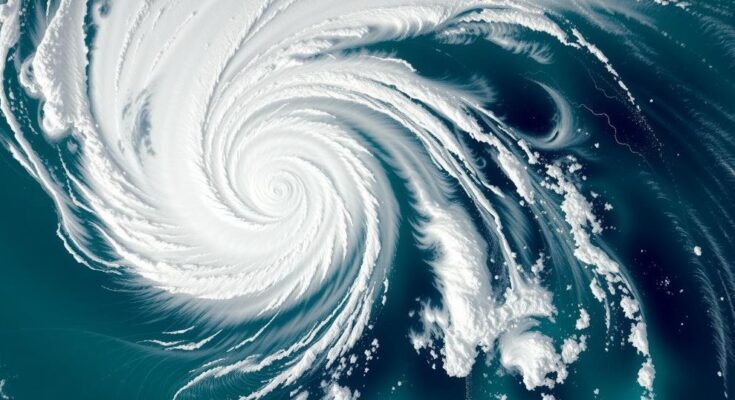On January 12, 2025, Tropical Storm Dikeledi struck Mayotte, following the devastation from Cyclone Chido. The storm brought heavy rain and high winds, leading to significant flooding and the opening of hundreds of emergency shelters. In Madagascar, Dikeledi caused flash floods that resulted in fatalities and displacements. French authorities mobilized emergency response personnel in Mayotte amid ongoing risks of flooding and landslides as forecasts predict potential reintensification of the storm toward Mozambique.
Tropical Storm Dikeledi recently impacted Mayotte, a French territory in the Indian Ocean, on January 12, 2025. This storm followed closely on the heels of Cyclone Chido, which caused widespread devastation in the region just weeks prior. Dikeledi brought heavy rain and sustained winds, prompting significant flooding in various areas including the village of Mbouini, leading to the opening of 80 emergency shelters to accommodate displaced residents following a red alert issued by local authorities.
Prior to its approach to Mayotte, Storm Dikeledi made landfall in Madagascar, where it caused torrential rain and subsequent flash floods, claiming three lives and displacing over 900 individuals in Antsiranana province. According to Malagasy disaster management authorities, the northern coast of Madagascar bore the brunt of the storm’s intensity. In Mayotte, Dikeledi passed at its closest point approximately 100 kilometers south, generating gusts reaching up to 90 kilometers per hour.
In response to the emergency, French authorities deployed over 4,000 personnel to assist with recovery efforts and to clear debris, ensuring that roads are reopened for access. The National Gendarmerie communicated their full mobilization in the aftermath of this severe weather event, urging residents to remain indoors during the ongoing red alert due to the imminent risk of flooding and landslides.
Cyclone Chido, which struck on December 14, 2024, was noted as the most catastrophic storm in ninety years, resulting in significant casualties and injuries, along with extensive property damage. This storm has led to growing frustrations among residents regarding the perceived lack of governmental support, particularly from France, for their needs during such crises. With Dikeledi on the move, forecasts indicate a potential reintensification into a cyclone, posing yet additional risks for nearby Mozambique and the Comoros Islands in the upcoming days.
Tropical storms and cyclones are a recurring threat in the Indian Ocean, particularly impacting regions such as Mayotte and Madagascar. The recent occurrences of severe weather events, including Cyclone Chido and now Tropical Storm Dikeledi, highlight the vulnerability of these territories. In light of the extreme weather patterns, local authorities and international organizations face challenges in addressing immediate relief needs, as well as long-term infrastructure improvements to mitigate future disasters. The impacts of such storms often include loss of life, displacement of communities, and calls to action for enhanced governmental support.
In summary, Tropical Storm Dikeledi has exacerbated the challenges faced by the residents of Mayotte, only weeks after the destruction caused by Cyclone Chido. Immediate responses from French authorities indicate a concerted effort to address the needs of the population as they confront recurring natural disasters. The ongoing situation underscores the urgent need for robust disaster preparedness and effective governmental support to enhance resilience against future storms and cyclones in the region.
Original Source: euroweeklynews.com




